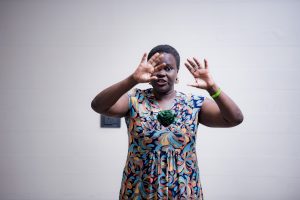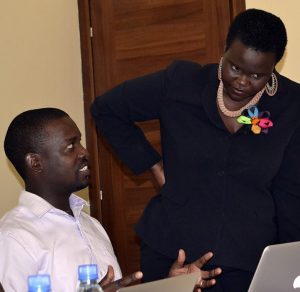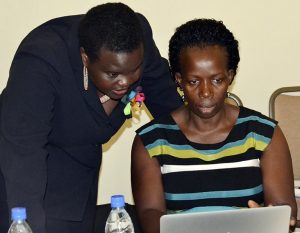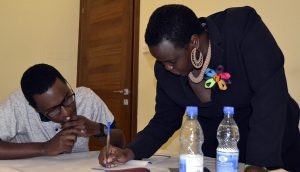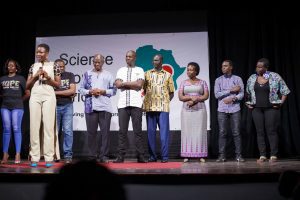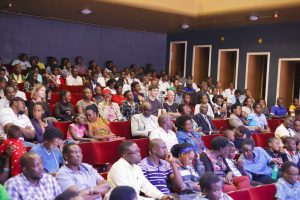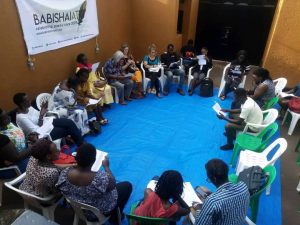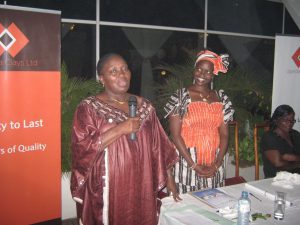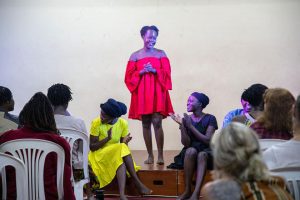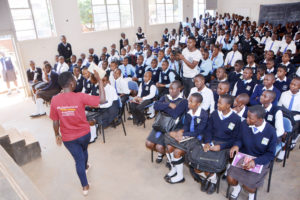Beverley Nambozo describes her remarkable experience, offering creative storytelling training, with five laudable scientists , from Uganda. Photo from Science Stories Africa.
It drives me to indescribably awesome heights, when I’m invited to speak, perform poetry, and train. When firebrand and mastermind behind Science Stories Africa, Patricia Nanteza, extended a request for me to train some of Uganda’s most ingenious scientists on how to creatively share their discoveries to the world, I accepted the invitation in a heartbeat.
At the start of a much-needed two-month holiday, in June 2019, I plunged into the training. Science Stories Africa is a platform intended to create connections between leading Ugandan scientists and their discoveries, to the rest of the world. The intention is to make science more palatable, relatable and creative. My job was to articulate that and train the scientists into managing their discoveries, difficult laboratory terms and impossible to believe experiments, into stories, so that entire audiences could hear and learn from them.
Allan Muhumuza, Engineer at Kiira Motors EV. Photo Courtesy of Science Stories Africa
In 2008, Vehicle Design Summit (VDS) Teams from 35 Pre-eminent Research Universities built a 5 seater Plug in Hybrid Electric Vehicle, The Vision 200 Led by Massachusetts Institute of Technology (MIT).
Makerere University, the only African team, developed the Power Train and in-Vehicle Communication Network for the Vision 200. The electric car made by the Makerere University Vehicle Design Project, was finished and was taken for its first test-drive on Tuesday 1st November 2011. The test-drive was successful and attracted a lot of local and international attention. Allan Muhumuza, who was amongst the senior team members of the project, a passionate and inspired new father, used his daughter, Atara, as an inspiration to model green cars that are environmentally friendly and offer more socially compatable options for other commuters and pedestrians.
Let’s embrace ourselves, too, for the first electric powered environment friendly public bus. We can’t wait!
With Dr. Priver Namanya Bwesigye, Photo courtesy of Science Stories Africa.
Priver genetically engineered entirely new plants, from a process known as cell suspension. Targeting a specific type of matooke highland breed, Priver, in four arduous years, challenged by walking away from the project, depression and fatigue, soldiered through with fortitude. Being able to re-generate plants from cells empowered Namanya and other scientists to try to enhance the plants’ defence mechanism through genetic engineering. This came at a crucial time when the particular matooke breed had begun significantly reducing in quantity. Now, it’s possible to reproduce this breed, through genetic engineering.
Martin Tumusiime, of Yo-Waste App!
Yo-Waste, is a mobile app that explores ways of reducing the heaps of garbage in your community, Their mission is simple:
To create sustainable and waste free communities. We do all this through developing innovative technology solutions that allow people to recycle more and haulers to divert more collected trash to recycling industries. As a young entrepreneur with knowledge of advanced technology Martin set to work with a group of youthful smarts and developed this timely, convenient and resourceful application.
Above is the entire group of five laudable Ugandan scientists, at the launch of Science Stories Africa in June 2019.
Prof. Wilberforce Tushemereirwe, Director of The National Agricultural Research Organisation (NARO), as a child, experienced the morbid reality of attending burials of other children. As an adult, his observation led him to realize that the large deficiency of Vitamin A in foods, could possibly be a leading factor of those early deaths.
Using Genetically Modified processes, he , with other scientists, have increased Vitamin A content in matooke. He stands by the word that the foods are safe for consumption.
Engineer Alphonse Candia, another formidable scientist, on growing up in Arua, where smoked fish was a delicacy, realised that with tragic deaths from liver cancer, there could be a link to the local ways fish was smoked. Through the invention of a smoking kiln, a prototype that was tested and found to be effective in preserving fish without the dark-smoke, Engineer Candia is heralded for his magnanimous work in science and in improving livelihoods.
Above are the mesmerized crowd, filling the National Theatre auditorium, listening to the heartfelt, endearing and empowering stories of the five scientists.
Photos are from Science Stories Africa.
For me, being part of the enchanting thread where dreams and nightmares turned into possibilities, to hear firsthand how lives are actually changed, thanks to scientists who sharpened their grit to make a difference. It’s nothing short of wow!
By Beverley Nambozo Nsengiyunva
*******
